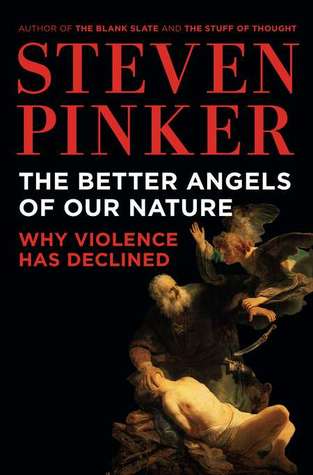Pessimism in Predictions and the False Sense of Insecurity
You would think that the disappearance of the gravest threat in the history of humanity would bring a sigh of relief among commentators on world affairs. Contrary to expert predictions, there was no invasion of Western Europe by Soviet tanks, no escalation of a crisis in Cuba or Berlin or the Middle East to a nuclear holocaust.1 The cities of the world were not vaporized; the atmosphere was not poisoned by radioactive fallout or choked with debris that blacked out the sun and sent Homo sapiens the way of the dinosaurs. Not only that, but a reunified Germany did not turn into a fourth reich, democracy did not go the way of monarchy, and the great powers and developed nations did not fall into a third world war but rather a long peace, which keeps getting longer. Surely the experts have been acknowledging the improvements in the world’s fortunes from a few decades ago.
But no—the pundits are glummer than ever! In 1989 John Gray foresaw “a return to the classical terrain of history, a terrain of great power rivalries . . . and irredentist claims and wars.”2 A New York Times editor wrote in 2007 that this return had already taken place: “It did not take long [after 1989] for the gyre to wobble back onto its dependably blood-soaked course, pushed along by fresh gusts of ideological violence and absolutism.”3 The political scientist Stanley Hoffman said that he has been discouraged from teaching his course on international relations because after the end of the Cold War, one heard “about nothing but terrorism, suicide bombings, displaced people, and genocides.” 4 The pessimism is bipartisan: in 2007 the conservative writer Norman Podhoretz published a book called World War IV (on “the long struggle against Islamofascism”), while the liberal columnist Frank Rich wrote that the world was “a more dangerous place than ever.”5 If Rich is correct, then the world was more dangerous in 2007 than it was during the two world wars, the Berlin crises of 1949 and 1961, the Cuban Missile Crisis, and all the wars in the Middle East. That’s pretty dangerous.
Why the gloom? Partly it’s the result of market forces in the punditry business, which favor the Cassandras over the Pollyannas. Partly it arises from human temperament: as David Hume observed, “The humour of blaming the present, and admiring the past, is strongly rooted in human nature, and has an influence even on persons endowed with the profoundest judgment and most extensive learning.” But mainly, I think, it comes from the innumeracy of our journalistic and intellectual culture. The journalist Michael Kinsley recently wrote, “It is a crushing disappointment that Boomers entered adulthood with Americans killing and dying halfway around the world, and now, as Boomers reach retirement and beyond, our country is doing the same damned thing.”6 This assumes that 5,000 Americans dying is the same damned thing as 58,000 Americans dying, and that a hundred thousand Iraqis being killed is the same damned thing as several million Vietnamese being killed. If we don’t keep an eye on the numbers, the programming policy “If it bleeds it leads” will feed the cognitive shortcut “The more memorable, the more frequent,” and we will end up with what has been called a false sense of insecurity.
Notes:
Folksonomies: perspective pessimism
Taxonomies:
/society/unrest and war (0.511262)
/law, govt and politics/politics (0.226677)
/society/work/retirement (0.222492)
Keywords:
Middle East (0.901690 (negative:-0.388733)), false sense (0.899529 (negative:-0.682287)), world war (0.889211 (neutral:0.000000)), great power rivalries (0.881688 (neutral:0.000000)), John Gray foresaw (0.879071 (neutral:0.000000)), writer Norman Podhoretz (0.876699 (neutral:0.000000)), New York Times (0.871941 (neutral:0.000000)), dependably blood-soaked course (0.869723 (neutral:0.000000)), journalist Michael Kinsley (0.866900 (negative:-0.351689)), damned thing (0.865438 (negative:-0.641856)), political scientist Stanley (0.861264 (neutral:0.000000)), liberal columnist Frank (0.860824 (neutral:0.000000)), Cuban Missile Crisis (0.857480 (neutral:0.000000)), world affairs (0.801859 (negative:-0.883253)), world wars (0.772103 (neutral:0.000000)), radioactive fallout (0.768732 (negative:-0.642750)), Western Europe (0.766083 (neutral:0.000000)), gravest threat (0.764728 (negative:-0.883253)), dangerous place (0.757869 (neutral:0.000000)), long peace (0.756280 (neutral:0.000000)), Soviet tanks (0.755459 (neutral:0.000000)), fresh gusts (0.755309 (neutral:0.000000)), suicide bombings (0.749546 (neutral:0.000000)), great powers (0.749080 (neutral:0.000000)), classical terrain (0.748903 (neutral:0.000000)), Cold War (0.748501 (neutral:0.000000)), irredentist claims (0.748145 (neutral:0.000000)), ideological violence (0.747803 (neutral:0.000000)), international relations (0.746220 (neutral:0.000000)), long struggle (0.744093 (neutral:0.000000))
Entities:
Middle East:Region (0.815465 (negative:-0.388733)), Berlin:City (0.769101 (negative:-0.379518)), Boomers:Person (0.688101 (negative:-0.543350)), Frank Rich:Person (0.680374 (positive:0.222967)), Stanley Hoffman:Person (0.640151 (negative:-0.517631)), World War:FieldTerminology (0.622021 (neutral:0.000000)), third world:FieldTerminology (0.617257 (neutral:0.000000)), Europe:Continent (0.578676 (neutral:0.000000)), Homo sapiens:FieldTerminology (0.578480 (negative:-0.642750)), David Hume:Person (0.577189 (neutral:0.000000)), Michael Kinsley:Person (0.572312 (negative:-0.351689)), Norman Podhoretz:Person (0.551713 (neutral:0.000000)), Germany:Country (0.537881 (neutral:0.000000)), John Gray:Person (0.526626 (neutral:0.000000)), Cuba:Country (0.524401 (negative:-0.388733)), Cold War:FieldTerminology (0.508520 (negative:-0.517631)), New York Times:PrintMedia (0.508400 (neutral:0.000000)), Pollyannas:City (0.489135 (neutral:0.000000)), scientist:JobTitle (0.463943 (negative:-0.517631)), editor:JobTitle (0.458170 (neutral:0.000000)), writer:JobTitle (0.451318 (neutral:0.000000))
Concepts:
Cold War (0.966018): dbpedia | freebase
World War II (0.884673): dbpedia | freebase | yago
Cuban Missile Crisis (0.728290): dbpedia | freebase | yago
World war (0.669240): dbpedia | freebase
United States (0.615182): website | dbpedia | ciaFactbook | freebase | opencyc | yago
World War III (0.551189): dbpedia | freebase | yago
Human (0.517186): dbpedia | freebase | opencyc
Soviet Union (0.433371): dbpedia | freebase | opencyc | yago





